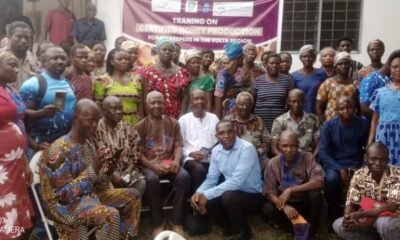Editorial
Road safety: Are drivers becoming more careful?

Stakeholders including the Ghana Police Service, the National Road Safety Authority, the Driver and Vehicle Licensing Authority launched yet another road safety campaign in November 2022 as the Christmas and New Year festivities approached.
The “Stay Alive; Gyae Obonsam Agyuma No,” crusade was to help reduce road accidents in the Eastern Region and beyond as crashes tended to increase during the yuletide.
Road experts maintain that deaths and injuries could have been avoided if drivers observed road regulations but it appears only a handful of them {drivers} and road users heed this caution.
Even before the 2022 Christmas celebrations started, a number of road accidents had been recorded, many of which might have been caused by driver negligence and bad roads.
Although the impact of the 2022 road safety campaign is yet to manifest, I believe drivers are becoming more careful on our roads. Reflecting on happenings in my locality as of January 5, 2023, I am convinced there was less ‘tragedy’ during the festive season.
This notwithstanding, the road safety campaigns should be an all-year activity. Public education on bad driving habits should not be intensified only on ‘special occasions’ or when sponsors secure enough funds to launch campaign.
Drivers should constantly be reminded that it is not safe to answer phone calls when driving.
No matter what speed one is driving at, mobile phones remain a distractive element. Apart from making voice calls, some drivers tend to bury their head behind the steering wheel to respond to text messages while in traffic.
Already, there are fines for drivers who breach road traffic regulations and I wish to encourage the police to apply those sanctions to the letter, especially when a driver’s carelessness leads to loss of lives.
While at it, I encourage stakeholders to push for the repair of all bad roads. Those without adequate furniture, including street lights and proper markings for safe driving should be restored while those which require dualisation should be completed in time.
By Josephine Nyorkor Ntreh & Serwaa Marfo,
Ghana Institute of Journalism.
Accra.
Editorial
To all Muslims, happy Eid ul Adha!
Muslims in Ghana joined the world yesterday to observe the Eid-ul-Adha; the second of the two main festivals in Islam.
Eid-ul-Adha takes place on the 10th of Dhu al-Hijja, the twelfth and last month of the Islamic calendar, and is also referred to as the “Festival of the Sacrifice.”
It symbolises Prophet Ibrahim’s (Abraham’s) readiness to offer his son as a sacrifice in response to Allah’s instruction.
In addition to making sacrifices, the celebration aims to spread unity, love, joy, and compassion.
In Ghana, people celebrated the day with special prayers, feasts, and the customary killing of an animal and sharing the flesh with their loved ones, neighbours, and the underprivileged.
During the celebration of the festival Muslims gather at mosques or open areas for congregational prayers early in the morning. After the prayers, people visit each other, exchange gifts, and enjoy festive meals.
One aspect of the celebration is the wearing of traditional Islamic clothing, such as kaftans, jalabiyas, and abayas, which are in high demand and cause prices to rise sharply during this time.
Abayas and jalabiyas, which are frequently imported from Turkey, Dubai, Egypt, and Northern Nigeria, have become very popular clothing items, leading to price increases, according to reports from our Northern Regional Correspondent.
“Some customers complain about the cost, but many still go ahead and buy because it’s Ramadan,” a store owner said.
However, as there is no set attire for the festival, many Muslims opted for modest, loose-fitting clothing that embodies Islamic principles.
The Spectator, believes that since the celebration is a wonderful occasion and Muslims want to feel happy throughout the festivities, the traditional attire should be reasonably priced so that others can celebrate in style.
We are glad that the holy month is still a precious time despite the economic strains, and that some people make the day extra special for their loved ones.
Despite the hectic preparations the emphasis should always be on appreciating the event’s profound spiritual meaning.
Happy Eid ul Adha to all Muslims.
Editorial
Review GTC’s ban on noise-making
Dear Editor,
I write to express my concerns regarding the annual ban on noise-making instituted by the Ga Traditional Council (GTC) and its impact on Christian churches and other religious institutions.
While I acknowledge and respect the cultural significance of this period for the Ga people, it is important to highlight the challenges it poses to churches within the Greater Accra Region.
The restrictions often affect worship services, prayer meetings, and other religious activities that rely on instruments and singing as core parts of worship. In some cases, churches are compelled to suspend midweek services or modify their mode of worship entirely.
It is important that cultural and religious practices coexist peacefully in a pluralistic society. Mutual respect and dialogue should be encouraged so that neither traditional authorities nor religious institutions felt marginalised.
I respectfully suggest that the Ga Traditional Council, in collaboration with the Christian Council and other faith-based groups, consider establishing clear, fair, and mutually agreeable guidelines that allow worship to continue in a way that respects traditional observances.
Peaceful coexistence is possible when there is open dialogue, understanding, and respect for all cultures and beliefs. Let us work together toward solutions that promote unity and harmony in our communities.
Eugene Ampiaw
Accra-Mamprobi







